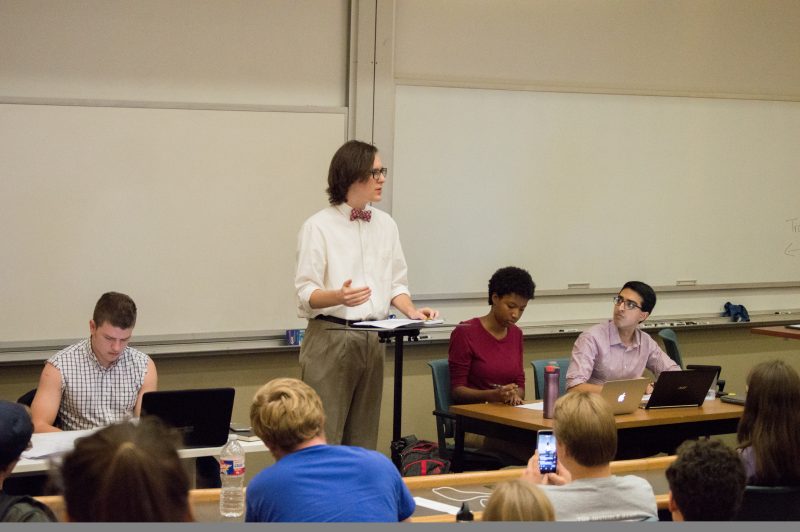To spread political awareness on campus, the Trinity University Forensic Society (TUFS) and the Contemporary, a student-run online publication that focuses on public affairs, hosted a debate over gun control. Tigers for Liberty (TFL) and Trinity Progressives (T-Prog) were asked to represent either side of the debate, each assisted by a Trinity debater. The groups have held similar debates in the past.
“We decided to create a gun control debate because it is a pretty timely topic in relation to a lot that’s going on politically, and we thought it would be really great to sort of flush out what the student groups on campus thought on gun control,” said junior Zabdi Salazar, treasurer of TUFS and contributor to the Contemporary. “I think it’ll be really great dialogue to help students to become informed and for organizations to push out what they think into the community.”
TFL and T-Prog were asked to discuss their thoughts about gun control. Each side comprised one member of their organization and one Trinity debater. Representing the affirmative for gun control was Ansh Khullar, a sophomore member of the debate team, and Simone Washington, a sophomore T-Prog member. The opposing side was Isaiah Mitchell, a sophomore on the debate team, and Kurt Hardee, a first-year TFL member.
The debate took the form of a presentation of each side’s’ argument, followed by a Q&A, then two separate rebuttal arguments and finished with questions from the audience.
“[Gun control] is something important to me, especially with what’s been going on in the news lately. I think it’ll be really interesting to see both sides and to kind of hear a perspective that you don’t normally hear,” said Kathryn Langemeier, a sophomore who attended the debate. “I think there should more talk about it on campus, just from the simple position that it’s a safety issue, and so not talking about it just contributes to more possibilities of being insecure on campus. I definitely think [college students] can be more politically active.”
After Travis Boyd, a sophomore and the debate moderator, opened up the floor, Washington gave the opening argument for the affirmative, taking the angle of gun control as a moral case. Simone cited recent shootings and described the mass suffering caused by those events.
The affirmative called for a gun database to make guns a more manageable good and less easily accessible to the mentally-impaired and those with criminal records.
“American pride should not come before American safety,” Washington said.
After a quick Q&A, Mitchell opened for the opposing side, first presenting his sleeveless button down as an exercise in his right to bear arms. Mitchell began his argument with statistics describing how the majority of violent crimes are committed with the use of hands and feet as weapons, and that areas with less gun regulation had fewer gun incidents.
Khullar followed Mitchell, calling for the use of statistical data as the main source of a solution. Khullar presented statistics that concluded that the U.S. has the highest gun-to-person ratio in the world and has a much higher gun violence percentage than countries with gun registration.
Khullar argued that there is no logical reason to own a gun because the numbers show no rise in safety from the purchase of one. Hardee ended the presentations of arguments by comparing the process of acquiring a gun registration to that of a car in the U.S. There is a car registry, but hardly anyone goes through the legal work of changing car titles. It would be the same with guns, making a registry ineffective.
Both sides’ club representatives and debaters admitted to arguing their own personal beliefs and stated the importance of discussing such issues.
“Debate encourages us to look at these issues and to have conversations with those we wouldn’t normally talk to,” Khullar said.
The TFL representative agreed with Khullar on the importance of dialogue.
“I think it is important to least be able to sit down, think about your opinion and be able to articulate your political beliefs and your reasoning behind them,” Hardee said.
Some audience members, like sophomore Alexander Bradley, attended the debate to show support of the dialogue and agreed that discourse is important.
“I decided to come because [shootings] have become more common, and we’ve become numb to them, and so things need to happen, and before things can happen, we need to figure out what should happen,” Bradley said.
After the teams had a chance to provide counter arguments, an anonymous vote was held to decide the who won the debate. Despite both team’s thorough research and valid arguments, the audience felt Trinity Progressives had won the debate.







